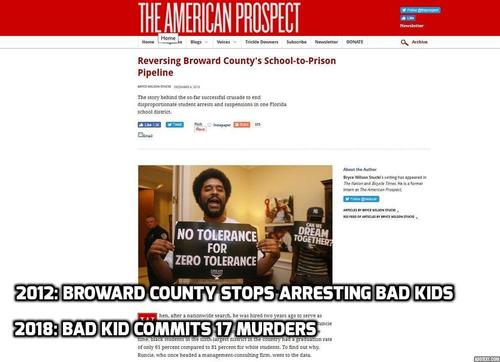


By Steve Sailer
02/27/2018
From The American Prospect in 2013:
Reversing Broward County’s School-to-Prison Pipeline
BRYCE WILSON STUCKI DECEMBER 4, 2013
The story behind the so-far successful crusade to end disproportionate student arrests and suspensions in one Florida school district.
When, after a nationwide search, he was hired two years ago to serve as superintendent of Florida’s Broward County Public Schools, Robert Runcie began brainstorming ways to close the racial achievement gap. …
“One of the first things I saw was a huge differential in minority students, black male students in particular, in terms of suspensions and arrests,” he says. Black students made up two-thirds of all suspensions during the 2011-2012 school year despite comprising only 40 percent of the student body. …
Broward announced broad changes designed to mitigate the use of harsh punishments for minor misbehavior at the beginning of this school year. While other districts have amended their discipline codes, prohibited arrests in some circumstances, and developed alternatives to suspension, Broward was able to do all these things at once with the cooperation of a group that included a member of the local NAACP, a school board member, a public defender, a local sheriff, a state prosecutor, and several others. In early November, The Miami Herald reported that suspensions were already down 40 percent and arrests were down 66 percent. …
Broward’s Collaborative Agreement on School Discipline was announced in early November. Instead of suspensions, students can now be referred to the PROMISE program, where they receive counseling for several days and then return to school. A host of non-violent misdemeanors no longer require an arrest, though officers can sometimes override that if they feel it is necessary (“I wanted to make sure deputies always had discretion,” says Scott Israel, Broward County’s sheriff). The school district’s Office of Minority Male Achievement reviews data to ensure that punishments for minor infractions and racial disparities are on the decline.
… “But what Broward did that really set it apart is they put together this incredible breadth of stakeholders. They have been able to not only address one piece of it, but create a set of policies that work together to hopefully eliminate the school-to-prison pipeline in Broward.”
Broward is unusual because representatives from law enforcement, the district, and the community were able to agree on reform, and the superintendent approved it. “In dealing with the previous administration, people were afraid to look at disparate impact issues,” says Weekes. “[Runcie] was not backing away from it.” The new superintendent released the data and acknowledged that the problem had a racial dynamic. “It’s a problem all over the country,” Runcie says, “and Broward is no exception.”